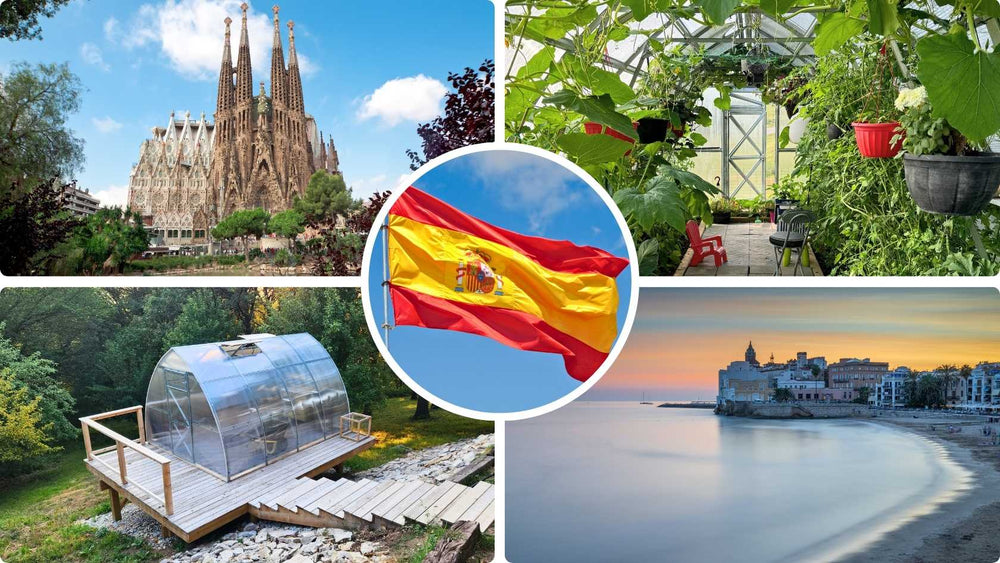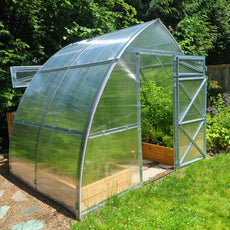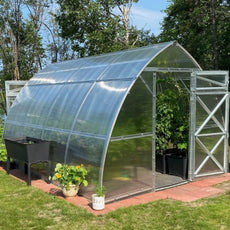Von den sengend heißen Ebenen Andalusiens bis zu den kühlen, feuchten Tälern Galiciens bietet Spanien eine der vielfältigsten und anspruchsvollsten Gartenlandschaften Europas.
Das Land erstreckt sich über die Winterhärtezonen 7a bis 11a und weist damit einige der extremsten Temperaturschwankungen des Kontinents auf. Da der Klimawandel die Wettermuster verschärft, stehen spanische Gärtner vor besonderen Herausforderungen, die innovative Lösungen erfordern.
In diesem Artikel erfahren Sie:
- Merkmale der spanischen Anbaugebiete
- Herausforderungen des Wachstums in Spanien
- Die Vorteile der Nutzung eines Gewächshauses in Spanien
- Warum Planta-Gewächshäuser?
In den letzten Jahren hatte Spanien mit beispiellosen Hitzewellen zu kämpfen. In manchen Regionen stiegen die Temperaturen auf über 45 °C , während in Teilen des Nordens immer noch mit Frostgefahr zu kämpfen ist.
Diese klimatische Vielfalt macht die spanische Gartenarbeit faszinierend und anspruchsvoll zugleich.

Bild von Plant Maps
Merkmale der spanischen Anbauregion
Die Wetterbedingungen in Spanien beeinflussen die Gartenbaupraktiken erheblich:
- Mediterranes Klima in den Küstengebieten, kontinentales Klima im Landesinneren
- Sommertemperaturen übersteigen in vielen Regionen regelmäßig die 40°C-Marke
- Milde Winter an der Küste, kalte Winter in den zentralen und nördlichen Gebieten
- Begrenzte und unregelmäßige Niederschlagsmuster
- Häufige Hitzewellen, insbesondere von Juni bis September
- Starke regionale Winde wie Levante und Poniente
- Gefahr von Spätfrösten in höher gelegenen Gebieten
Diese Wettermuster bringen Herausforderungen mit sich, beispielsweise Wasserstress, Hitzeschäden an den Pflanzen und den Bedarf an dürreresistenten Sorten. Die primäre Wachstumsperiode ist je nach Region unterschiedlich und reicht vom ganzjährigen Anbau im Süden bis zu einer kürzeren Saison von 6–7 Monaten im Norden .

Herausforderungen des Wachstums in Spanien
Extreme Hitze
Die größte Herausforderung für spanische Gärtner besteht darin, mit Sommertemperaturen umzugehen, die regelmäßig 40 °C übersteigen, was viele Pflanzenarten schädigen oder töten kann.
Wasserknappheit
Unregelmäßige Niederschläge und häufige Dürren erfordern ein sorgfältiges Wassermanagement und Bewässerungssysteme, insbesondere in den zentralen und südlichen Regionen.
Starke Winde
Starke Winde können Pflanzen schädigen und die Wasserverdunstung in Küsten- und Bergregionen erhöhen, weshalb geschützte Anbauflächen unerlässlich sind.

Die Vorteile der Nutzung eines Gewächshauses in Spanien
Die Nutzung eines Gewächshauses in Spanien bietet Gärtnern einen wichtigen Schutz vor extremen Wetterbedingungen und schafft gleichzeitig die Möglichkeit zum ganzjährigen Anbau.
1. Verlängern Sie Ihre Vegetationsperiode
- Ohne Gewächshaus:
Die Wachstumsperiode im Freien ist je nach Region sehr unterschiedlich. In den südlichen Regionen sind die Wachstumsperioden zwar länger, aber sie haben mit extremer Hitze zu kämpfen, während in den nördlichen Regionen die Wachstumsperioden aufgrund der kühleren Temperaturen kürzer sind.
- Mit einem Gewächshaus:
Bei richtiger Bewirtschaftung können Gewächshäuser in Spanien das ganze Jahr über Wachstumsbedingungen bieten, mit Kühlsystemen für die Sommerhitze und Schutz vor der Winterkälte in nördlichen Regionen.
2. Bauen Sie eine größere Pflanzenvielfalt an
- Ohne Gewächshaus:
Spanische Gärtner konzentrieren sich typischerweise auf hitzebeständige Gemüsesorten wie:
|
|
- Mit einem Gewächshaus
Ein Gewächshaus in Spanien ermöglicht den ganzjährigen Anbau temperaturempfindlicher Pflanzen, darunter:
|
|
|

Warum Planta-Gewächshäuser?
- Windbeständig bis 100 km/h (erfahren Sie mehr darüber, wie unsere Gewächshäuser in Höhenlagen standhalten).
- Hält einer Schneelast von bis zu 480 kg pro Quadratmeter stand.
- Hergestellt mit einem robusten Rahmen aus verzinktem Stahl.
- Polycarbonatplatten bieten 100 % Schutz vor UV-Strahlen.
- Das Sungrow-Gewächshaus hat eine glockenförmige Form , sodass Wind, Schnee und Hagel an den Seiten abperlen können.
- Ausziehbar ( Modelle von Sungrow , Sigma und Farmer können über 30 Meter hinaus ausgezogen werden)
- Hergestellt in Europa und ausschließlich importiert
- Wartungsfrei




